ACC568 - Audit Report Analysis: FFA and ASX Corporate Governance
VerifiedAdded on 2023/01/16
|12
|2924
|22
Report
AI Summary
This report analyzes the audit performance of Samway Baker Fitzgerald (SBF) for Far Faraway Pastoral Limited (FFA). The report examines the structure of FFA's board of directors in relation to ASX Corporate Governance Principles, highlighting issues such as the lack of a nomination committee and the absence of independent directors. It recommends restructuring the board to comply with ASX guidelines. The report also addresses ethical concerns regarding revenue recognition practices at FFA, referencing the Code of Ethics for Professional Accountants and the American Accounting Association (AAA) model. The report finds that SBF failed to exercise due care and outlines the duties owed to stakeholders. The analysis covers the issues with the board of directors, revenue recognition and the responsibilities of the auditor, concluding that the FFA's board structure does not fulfill the requirements of the ASX Corporate Governance Principles.
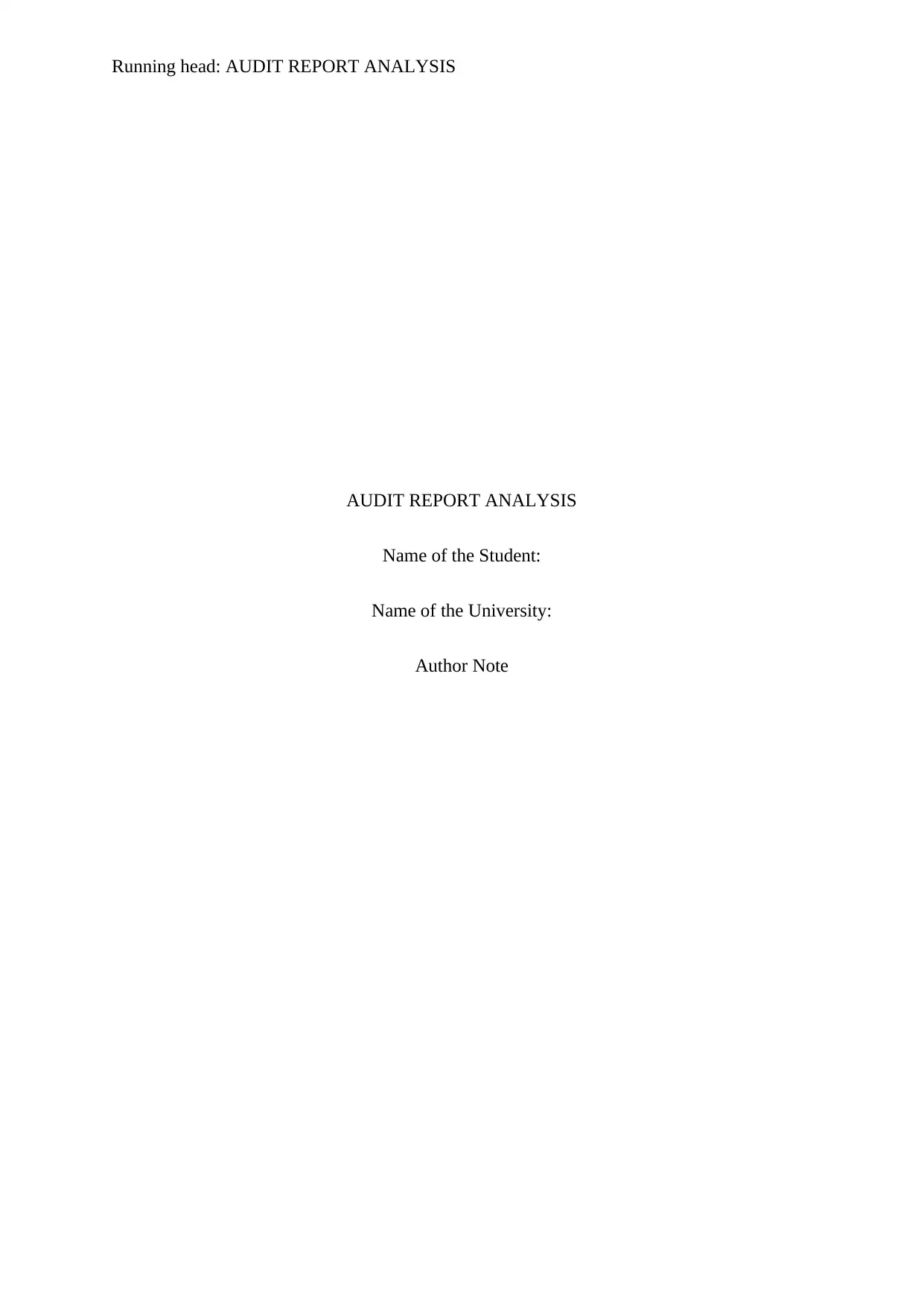
Running head: AUDIT REPORT ANALYSIS
AUDIT REPORT ANALYSIS
Name of the Student:
Name of the University:
Author Note
AUDIT REPORT ANALYSIS
Name of the Student:
Name of the University:
Author Note
Paraphrase This Document
Need a fresh take? Get an instant paraphrase of this document with our AI Paraphraser
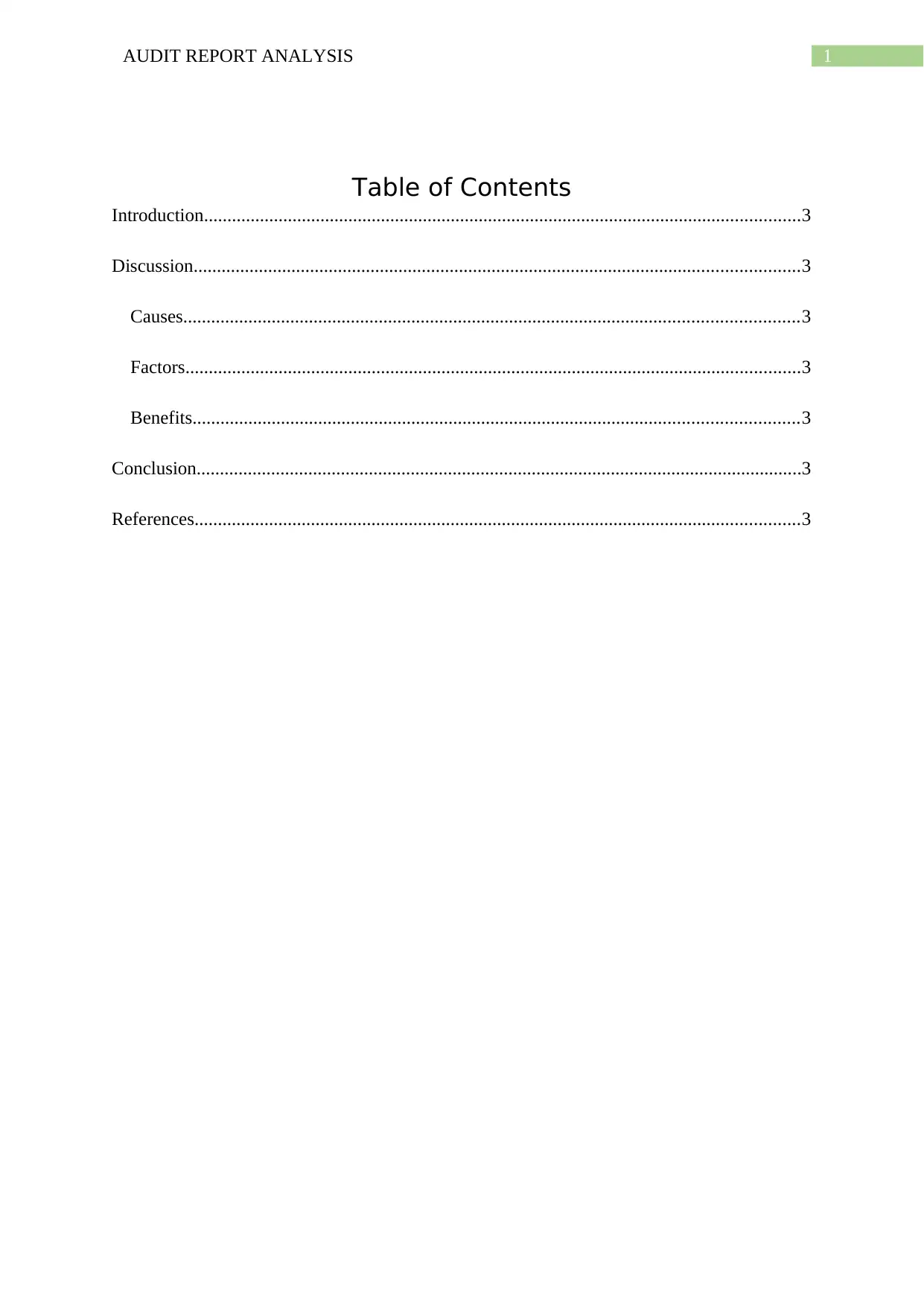
1AUDIT REPORT ANALYSIS
Table of Contents
Introduction................................................................................................................................3
Discussion..................................................................................................................................3
Causes....................................................................................................................................3
Factors....................................................................................................................................3
Benefits..................................................................................................................................3
Conclusion..................................................................................................................................3
References..................................................................................................................................3
Table of Contents
Introduction................................................................................................................................3
Discussion..................................................................................................................................3
Causes....................................................................................................................................3
Factors....................................................................................................................................3
Benefits..................................................................................................................................3
Conclusion..................................................................................................................................3
References..................................................................................................................................3
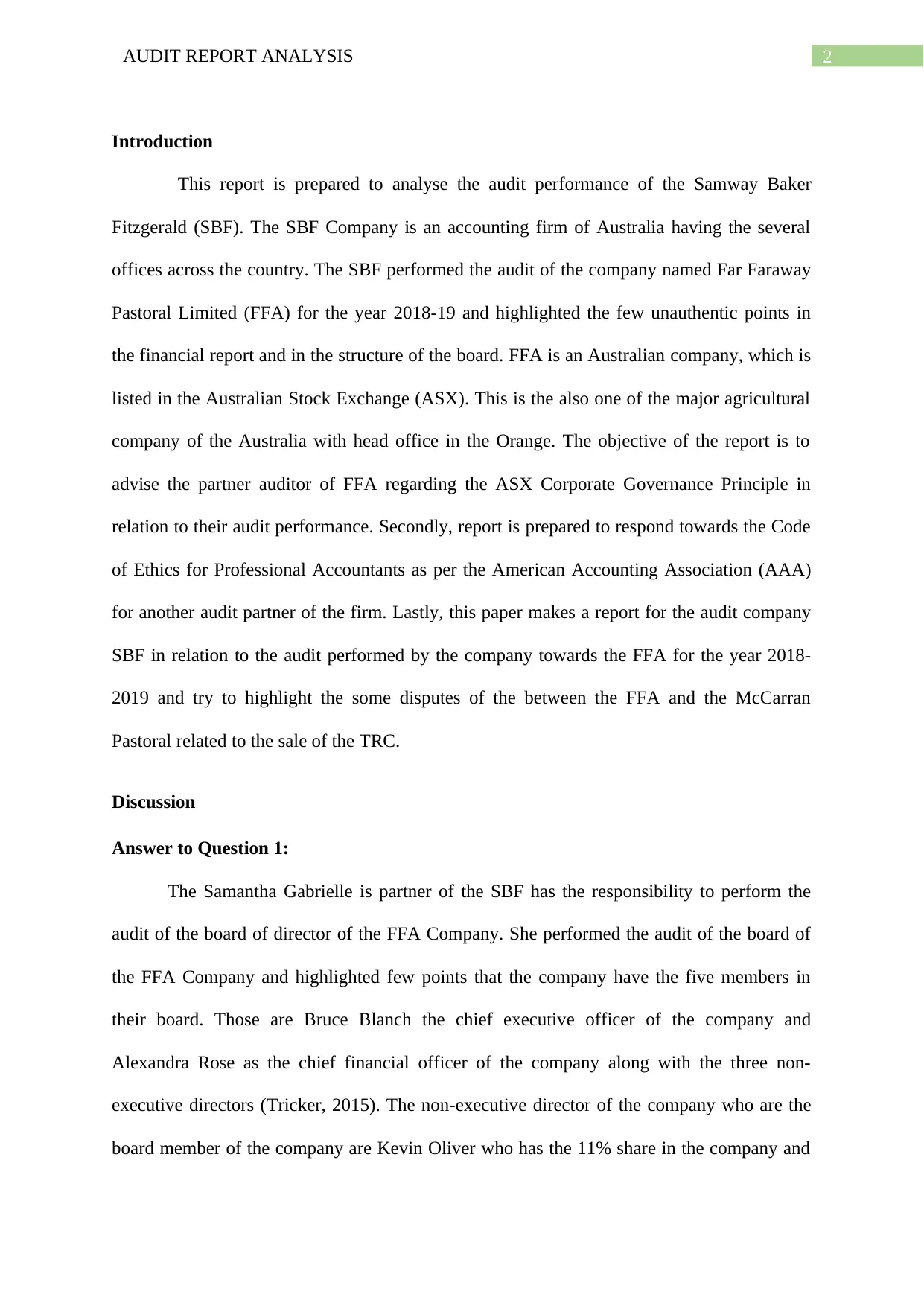
2AUDIT REPORT ANALYSIS
Introduction
This report is prepared to analyse the audit performance of the Samway Baker
Fitzgerald (SBF). The SBF Company is an accounting firm of Australia having the several
offices across the country. The SBF performed the audit of the company named Far Faraway
Pastoral Limited (FFA) for the year 2018-19 and highlighted the few unauthentic points in
the financial report and in the structure of the board. FFA is an Australian company, which is
listed in the Australian Stock Exchange (ASX). This is the also one of the major agricultural
company of the Australia with head office in the Orange. The objective of the report is to
advise the partner auditor of FFA regarding the ASX Corporate Governance Principle in
relation to their audit performance. Secondly, report is prepared to respond towards the Code
of Ethics for Professional Accountants as per the American Accounting Association (AAA)
for another audit partner of the firm. Lastly, this paper makes a report for the audit company
SBF in relation to the audit performed by the company towards the FFA for the year 2018-
2019 and try to highlight the some disputes of the between the FFA and the McCarran
Pastoral related to the sale of the TRC.
Discussion
Answer to Question 1:
The Samantha Gabrielle is partner of the SBF has the responsibility to perform the
audit of the board of director of the FFA Company. She performed the audit of the board of
the FFA Company and highlighted few points that the company have the five members in
their board. Those are Bruce Blanch the chief executive officer of the company and
Alexandra Rose as the chief financial officer of the company along with the three non-
executive directors (Tricker, 2015). The non-executive director of the company who are the
board member of the company are Kevin Oliver who has the 11% share in the company and
Introduction
This report is prepared to analyse the audit performance of the Samway Baker
Fitzgerald (SBF). The SBF Company is an accounting firm of Australia having the several
offices across the country. The SBF performed the audit of the company named Far Faraway
Pastoral Limited (FFA) for the year 2018-19 and highlighted the few unauthentic points in
the financial report and in the structure of the board. FFA is an Australian company, which is
listed in the Australian Stock Exchange (ASX). This is the also one of the major agricultural
company of the Australia with head office in the Orange. The objective of the report is to
advise the partner auditor of FFA regarding the ASX Corporate Governance Principle in
relation to their audit performance. Secondly, report is prepared to respond towards the Code
of Ethics for Professional Accountants as per the American Accounting Association (AAA)
for another audit partner of the firm. Lastly, this paper makes a report for the audit company
SBF in relation to the audit performed by the company towards the FFA for the year 2018-
2019 and try to highlight the some disputes of the between the FFA and the McCarran
Pastoral related to the sale of the TRC.
Discussion
Answer to Question 1:
The Samantha Gabrielle is partner of the SBF has the responsibility to perform the
audit of the board of director of the FFA Company. She performed the audit of the board of
the FFA Company and highlighted few points that the company have the five members in
their board. Those are Bruce Blanch the chief executive officer of the company and
Alexandra Rose as the chief financial officer of the company along with the three non-
executive directors (Tricker, 2015). The non-executive director of the company who are the
board member of the company are Kevin Oliver who has the 11% share in the company and
⊘ This is a preview!⊘
Do you want full access?
Subscribe today to unlock all pages.

Trusted by 1+ million students worldwide
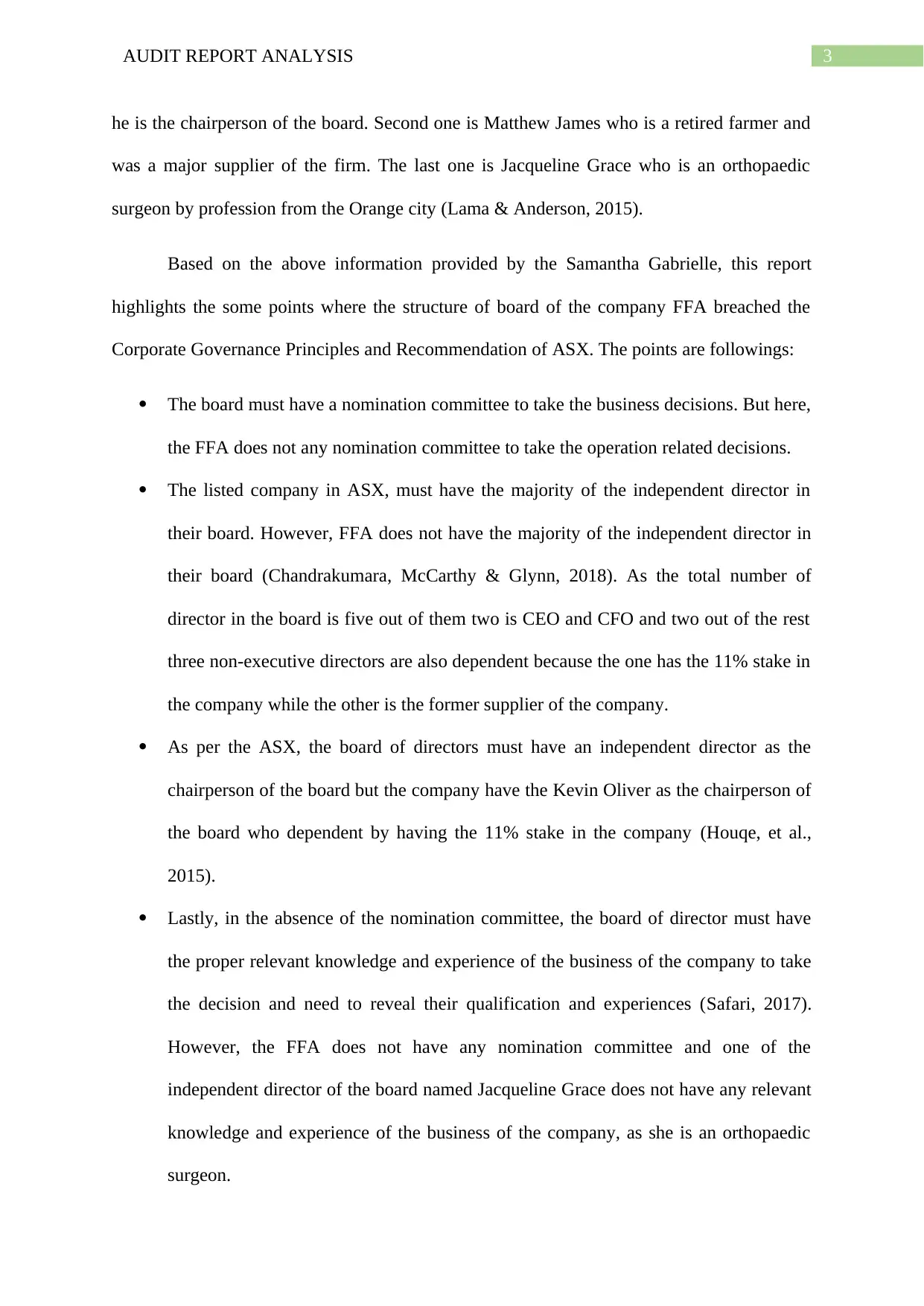
3AUDIT REPORT ANALYSIS
he is the chairperson of the board. Second one is Matthew James who is a retired farmer and
was a major supplier of the firm. The last one is Jacqueline Grace who is an orthopaedic
surgeon by profession from the Orange city (Lama & Anderson, 2015).
Based on the above information provided by the Samantha Gabrielle, this report
highlights the some points where the structure of board of the company FFA breached the
Corporate Governance Principles and Recommendation of ASX. The points are followings:
The board must have a nomination committee to take the business decisions. But here,
the FFA does not any nomination committee to take the operation related decisions.
The listed company in ASX, must have the majority of the independent director in
their board. However, FFA does not have the majority of the independent director in
their board (Chandrakumara, McCarthy & Glynn, 2018). As the total number of
director in the board is five out of them two is CEO and CFO and two out of the rest
three non-executive directors are also dependent because the one has the 11% stake in
the company while the other is the former supplier of the company.
As per the ASX, the board of directors must have an independent director as the
chairperson of the board but the company have the Kevin Oliver as the chairperson of
the board who dependent by having the 11% stake in the company (Houqe, et al.,
2015).
Lastly, in the absence of the nomination committee, the board of director must have
the proper relevant knowledge and experience of the business of the company to take
the decision and need to reveal their qualification and experiences (Safari, 2017).
However, the FFA does not have any nomination committee and one of the
independent director of the board named Jacqueline Grace does not have any relevant
knowledge and experience of the business of the company, as she is an orthopaedic
surgeon.
he is the chairperson of the board. Second one is Matthew James who is a retired farmer and
was a major supplier of the firm. The last one is Jacqueline Grace who is an orthopaedic
surgeon by profession from the Orange city (Lama & Anderson, 2015).
Based on the above information provided by the Samantha Gabrielle, this report
highlights the some points where the structure of board of the company FFA breached the
Corporate Governance Principles and Recommendation of ASX. The points are followings:
The board must have a nomination committee to take the business decisions. But here,
the FFA does not any nomination committee to take the operation related decisions.
The listed company in ASX, must have the majority of the independent director in
their board. However, FFA does not have the majority of the independent director in
their board (Chandrakumara, McCarthy & Glynn, 2018). As the total number of
director in the board is five out of them two is CEO and CFO and two out of the rest
three non-executive directors are also dependent because the one has the 11% stake in
the company while the other is the former supplier of the company.
As per the ASX, the board of directors must have an independent director as the
chairperson of the board but the company have the Kevin Oliver as the chairperson of
the board who dependent by having the 11% stake in the company (Houqe, et al.,
2015).
Lastly, in the absence of the nomination committee, the board of director must have
the proper relevant knowledge and experience of the business of the company to take
the decision and need to reveal their qualification and experiences (Safari, 2017).
However, the FFA does not have any nomination committee and one of the
independent director of the board named Jacqueline Grace does not have any relevant
knowledge and experience of the business of the company, as she is an orthopaedic
surgeon.
Paraphrase This Document
Need a fresh take? Get an instant paraphrase of this document with our AI Paraphraser
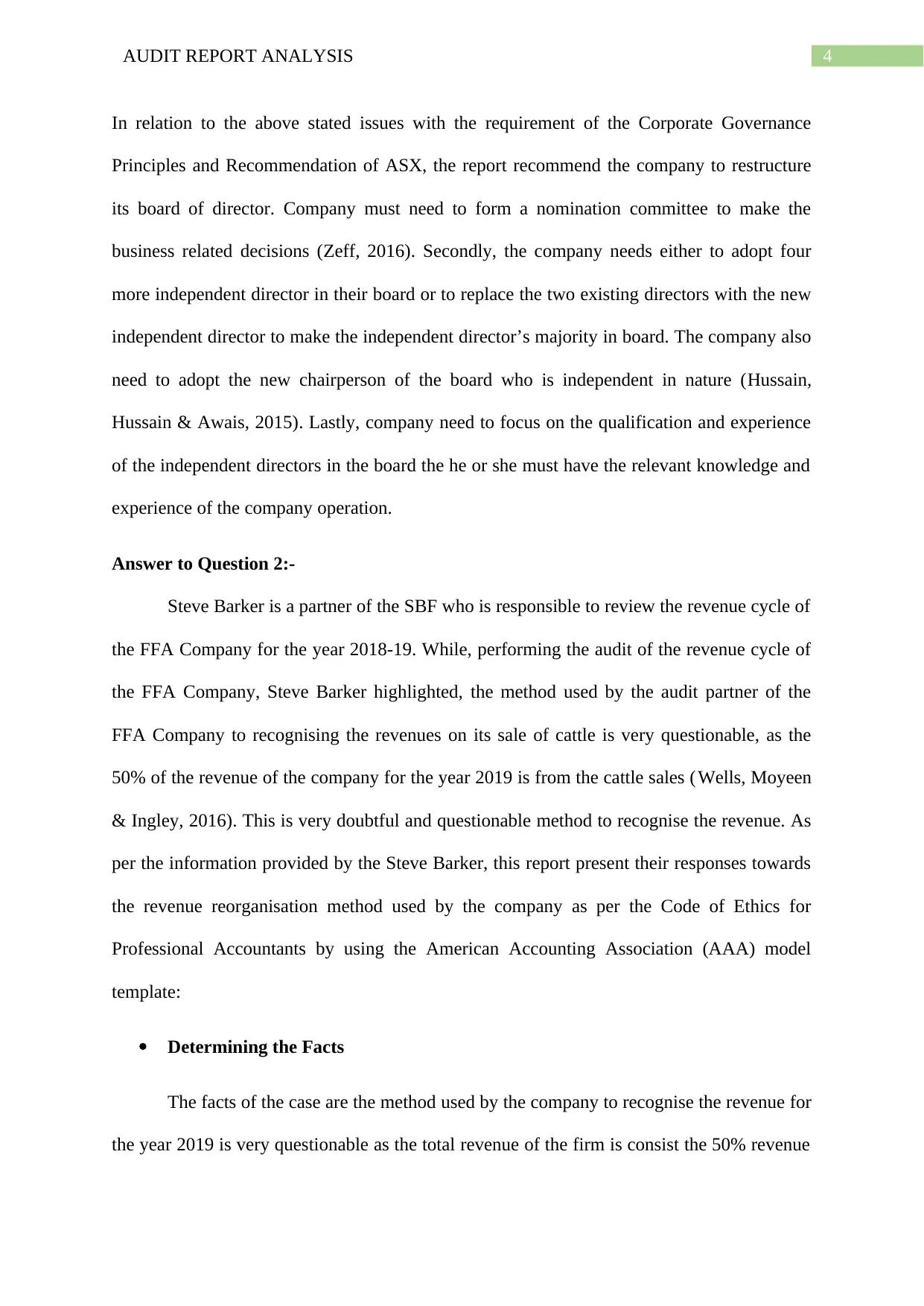
4AUDIT REPORT ANALYSIS
In relation to the above stated issues with the requirement of the Corporate Governance
Principles and Recommendation of ASX, the report recommend the company to restructure
its board of director. Company must need to form a nomination committee to make the
business related decisions (Zeff, 2016). Secondly, the company needs either to adopt four
more independent director in their board or to replace the two existing directors with the new
independent director to make the independent director’s majority in board. The company also
need to adopt the new chairperson of the board who is independent in nature (Hussain,
Hussain & Awais, 2015). Lastly, company need to focus on the qualification and experience
of the independent directors in the board the he or she must have the relevant knowledge and
experience of the company operation.
Answer to Question 2:-
Steve Barker is a partner of the SBF who is responsible to review the revenue cycle of
the FFA Company for the year 2018-19. While, performing the audit of the revenue cycle of
the FFA Company, Steve Barker highlighted, the method used by the audit partner of the
FFA Company to recognising the revenues on its sale of cattle is very questionable, as the
50% of the revenue of the company for the year 2019 is from the cattle sales ( Wells, Moyeen
& Ingley, 2016). This is very doubtful and questionable method to recognise the revenue. As
per the information provided by the Steve Barker, this report present their responses towards
the revenue reorganisation method used by the company as per the Code of Ethics for
Professional Accountants by using the American Accounting Association (AAA) model
template:
Determining the Facts
The facts of the case are the method used by the company to recognise the revenue for
the year 2019 is very questionable as the total revenue of the firm is consist the 50% revenue
In relation to the above stated issues with the requirement of the Corporate Governance
Principles and Recommendation of ASX, the report recommend the company to restructure
its board of director. Company must need to form a nomination committee to make the
business related decisions (Zeff, 2016). Secondly, the company needs either to adopt four
more independent director in their board or to replace the two existing directors with the new
independent director to make the independent director’s majority in board. The company also
need to adopt the new chairperson of the board who is independent in nature (Hussain,
Hussain & Awais, 2015). Lastly, company need to focus on the qualification and experience
of the independent directors in the board the he or she must have the relevant knowledge and
experience of the company operation.
Answer to Question 2:-
Steve Barker is a partner of the SBF who is responsible to review the revenue cycle of
the FFA Company for the year 2018-19. While, performing the audit of the revenue cycle of
the FFA Company, Steve Barker highlighted, the method used by the audit partner of the
FFA Company to recognising the revenues on its sale of cattle is very questionable, as the
50% of the revenue of the company for the year 2019 is from the cattle sales ( Wells, Moyeen
& Ingley, 2016). This is very doubtful and questionable method to recognise the revenue. As
per the information provided by the Steve Barker, this report present their responses towards
the revenue reorganisation method used by the company as per the Code of Ethics for
Professional Accountants by using the American Accounting Association (AAA) model
template:
Determining the Facts
The facts of the case are the method used by the company to recognise the revenue for
the year 2019 is very questionable as the total revenue of the firm is consist the 50% revenue
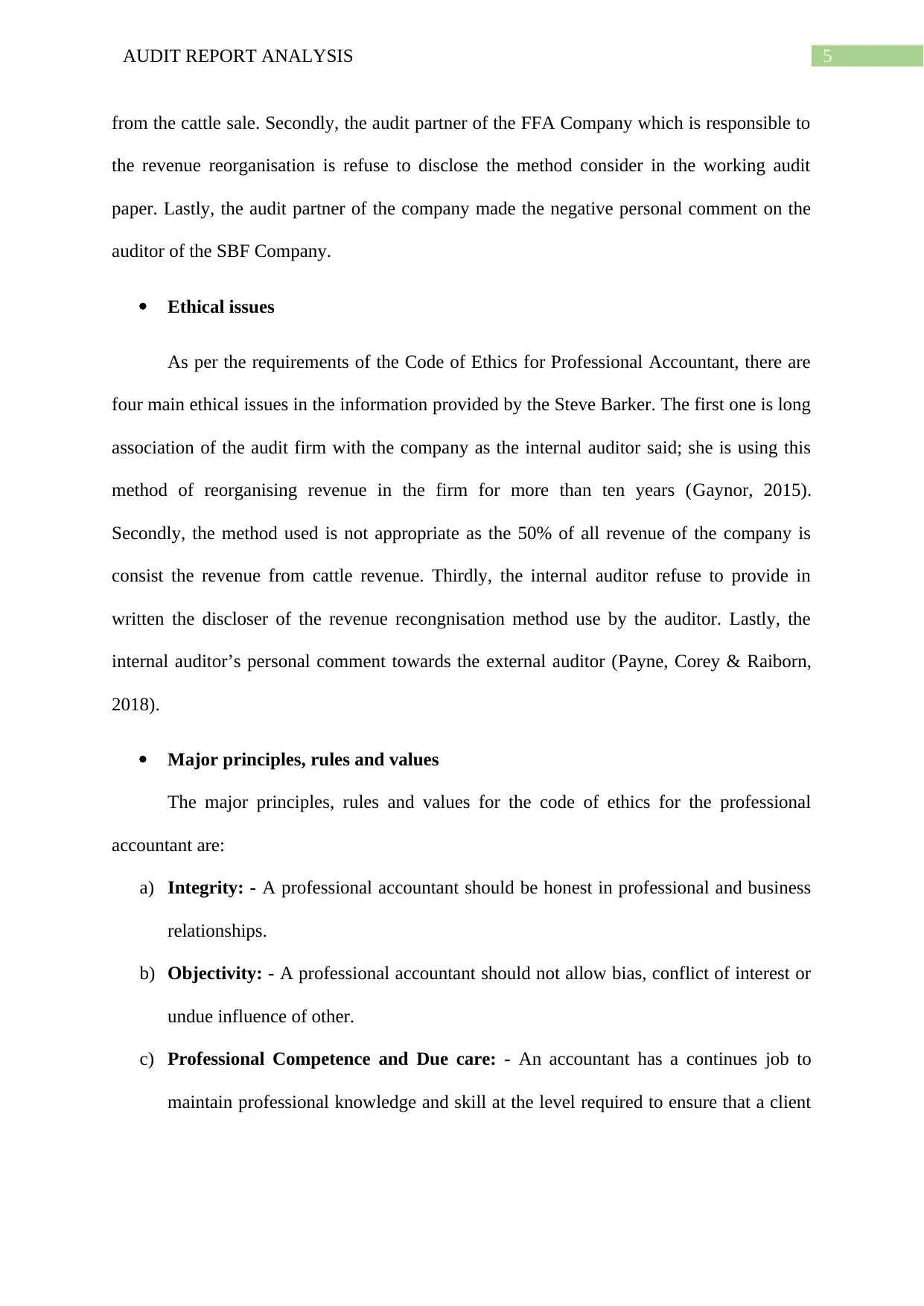
5AUDIT REPORT ANALYSIS
from the cattle sale. Secondly, the audit partner of the FFA Company which is responsible to
the revenue reorganisation is refuse to disclose the method consider in the working audit
paper. Lastly, the audit partner of the company made the negative personal comment on the
auditor of the SBF Company.
Ethical issues
As per the requirements of the Code of Ethics for Professional Accountant, there are
four main ethical issues in the information provided by the Steve Barker. The first one is long
association of the audit firm with the company as the internal auditor said; she is using this
method of reorganising revenue in the firm for more than ten years (Gaynor, 2015).
Secondly, the method used is not appropriate as the 50% of all revenue of the company is
consist the revenue from cattle revenue. Thirdly, the internal auditor refuse to provide in
written the discloser of the revenue recongnisation method use by the auditor. Lastly, the
internal auditor’s personal comment towards the external auditor (Payne, Corey & Raiborn,
2018).
Major principles, rules and values
The major principles, rules and values for the code of ethics for the professional
accountant are:
a) Integrity: - A professional accountant should be honest in professional and business
relationships.
b) Objectivity: - A professional accountant should not allow bias, conflict of interest or
undue influence of other.
c) Professional Competence and Due care: - An accountant has a continues job to
maintain professional knowledge and skill at the level required to ensure that a client
from the cattle sale. Secondly, the audit partner of the FFA Company which is responsible to
the revenue reorganisation is refuse to disclose the method consider in the working audit
paper. Lastly, the audit partner of the company made the negative personal comment on the
auditor of the SBF Company.
Ethical issues
As per the requirements of the Code of Ethics for Professional Accountant, there are
four main ethical issues in the information provided by the Steve Barker. The first one is long
association of the audit firm with the company as the internal auditor said; she is using this
method of reorganising revenue in the firm for more than ten years (Gaynor, 2015).
Secondly, the method used is not appropriate as the 50% of all revenue of the company is
consist the revenue from cattle revenue. Thirdly, the internal auditor refuse to provide in
written the discloser of the revenue recongnisation method use by the auditor. Lastly, the
internal auditor’s personal comment towards the external auditor (Payne, Corey & Raiborn,
2018).
Major principles, rules and values
The major principles, rules and values for the code of ethics for the professional
accountant are:
a) Integrity: - A professional accountant should be honest in professional and business
relationships.
b) Objectivity: - A professional accountant should not allow bias, conflict of interest or
undue influence of other.
c) Professional Competence and Due care: - An accountant has a continues job to
maintain professional knowledge and skill at the level required to ensure that a client
⊘ This is a preview!⊘
Do you want full access?
Subscribe today to unlock all pages.

Trusted by 1+ million students worldwide
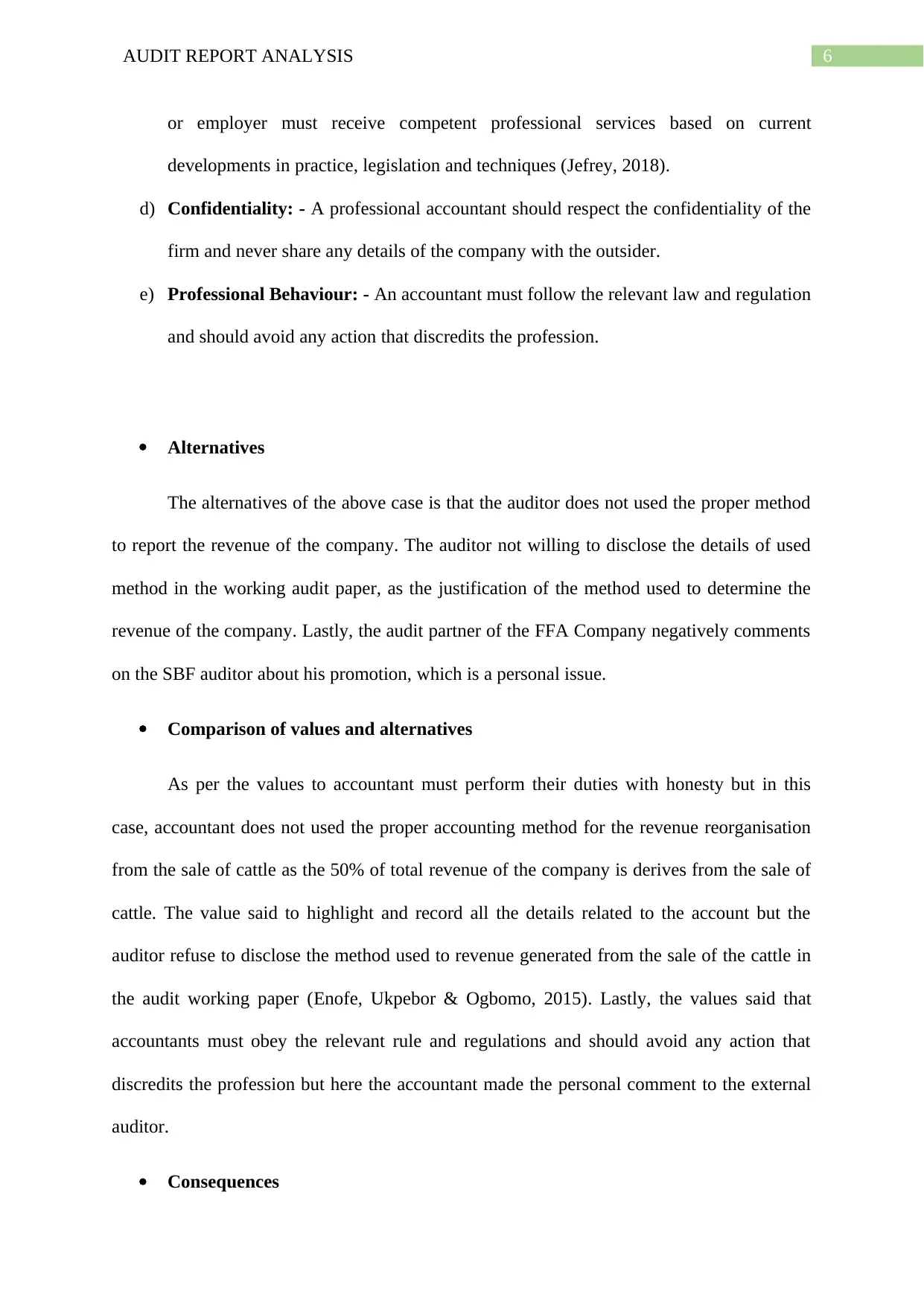
6AUDIT REPORT ANALYSIS
or employer must receive competent professional services based on current
developments in practice, legislation and techniques (Jefrey, 2018).
d) Confidentiality: - A professional accountant should respect the confidentiality of the
firm and never share any details of the company with the outsider.
e) Professional Behaviour: - An accountant must follow the relevant law and regulation
and should avoid any action that discredits the profession.
Alternatives
The alternatives of the above case is that the auditor does not used the proper method
to report the revenue of the company. The auditor not willing to disclose the details of used
method in the working audit paper, as the justification of the method used to determine the
revenue of the company. Lastly, the audit partner of the FFA Company negatively comments
on the SBF auditor about his promotion, which is a personal issue.
Comparison of values and alternatives
As per the values to accountant must perform their duties with honesty but in this
case, accountant does not used the proper accounting method for the revenue reorganisation
from the sale of cattle as the 50% of total revenue of the company is derives from the sale of
cattle. The value said to highlight and record all the details related to the account but the
auditor refuse to disclose the method used to revenue generated from the sale of the cattle in
the audit working paper (Enofe, Ukpebor & Ogbomo, 2015). Lastly, the values said that
accountants must obey the relevant rule and regulations and should avoid any action that
discredits the profession but here the accountant made the personal comment to the external
auditor.
Consequences
or employer must receive competent professional services based on current
developments in practice, legislation and techniques (Jefrey, 2018).
d) Confidentiality: - A professional accountant should respect the confidentiality of the
firm and never share any details of the company with the outsider.
e) Professional Behaviour: - An accountant must follow the relevant law and regulation
and should avoid any action that discredits the profession.
Alternatives
The alternatives of the above case is that the auditor does not used the proper method
to report the revenue of the company. The auditor not willing to disclose the details of used
method in the working audit paper, as the justification of the method used to determine the
revenue of the company. Lastly, the audit partner of the FFA Company negatively comments
on the SBF auditor about his promotion, which is a personal issue.
Comparison of values and alternatives
As per the values to accountant must perform their duties with honesty but in this
case, accountant does not used the proper accounting method for the revenue reorganisation
from the sale of cattle as the 50% of total revenue of the company is derives from the sale of
cattle. The value said to highlight and record all the details related to the account but the
auditor refuse to disclose the method used to revenue generated from the sale of the cattle in
the audit working paper (Enofe, Ukpebor & Ogbomo, 2015). Lastly, the values said that
accountants must obey the relevant rule and regulations and should avoid any action that
discredits the profession but here the accountant made the personal comment to the external
auditor.
Consequences
Paraphrase This Document
Need a fresh take? Get an instant paraphrase of this document with our AI Paraphraser
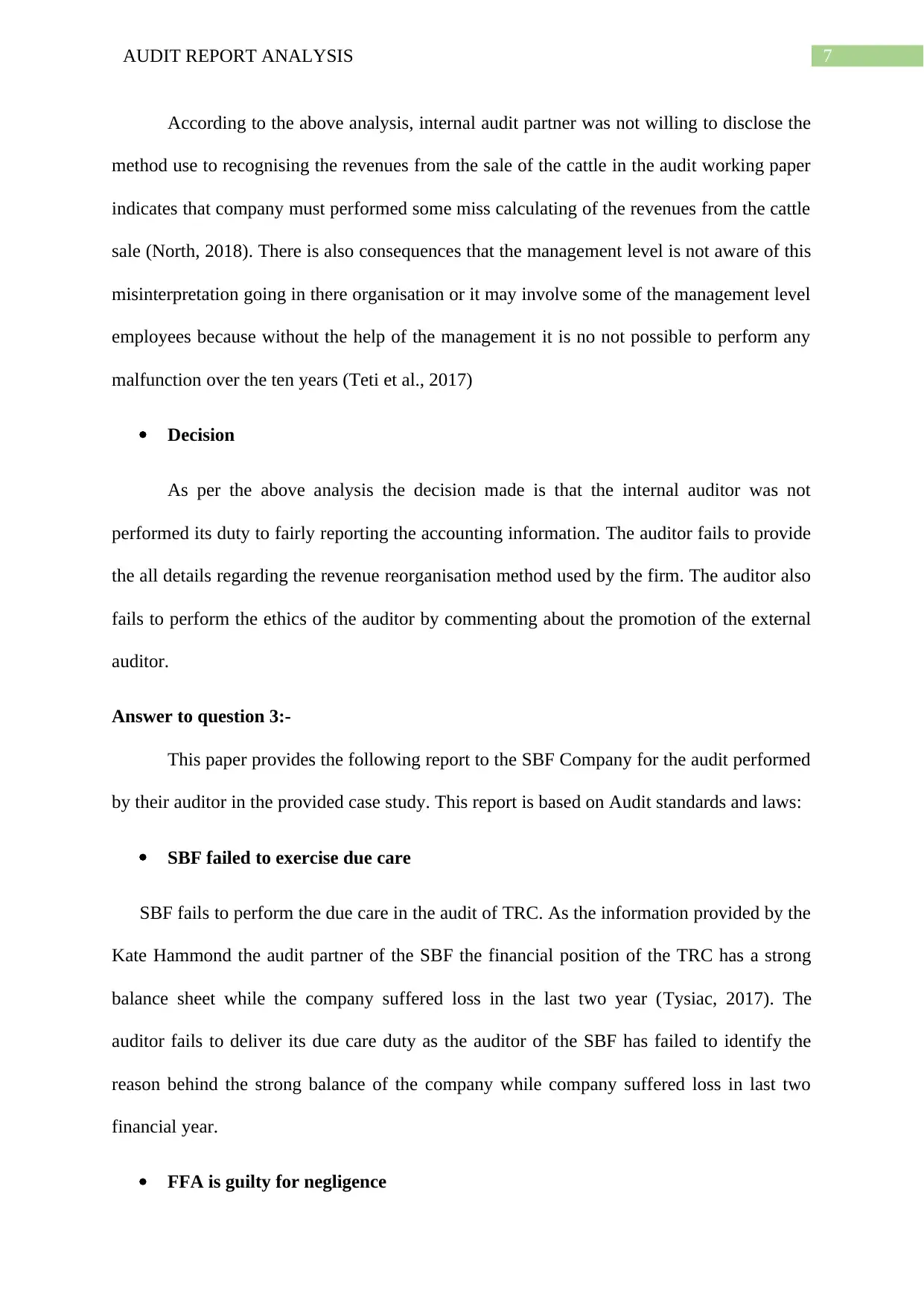
7AUDIT REPORT ANALYSIS
According to the above analysis, internal audit partner was not willing to disclose the
method use to recognising the revenues from the sale of the cattle in the audit working paper
indicates that company must performed some miss calculating of the revenues from the cattle
sale (North, 2018). There is also consequences that the management level is not aware of this
misinterpretation going in there organisation or it may involve some of the management level
employees because without the help of the management it is no not possible to perform any
malfunction over the ten years (Teti et al., 2017)
Decision
As per the above analysis the decision made is that the internal auditor was not
performed its duty to fairly reporting the accounting information. The auditor fails to provide
the all details regarding the revenue reorganisation method used by the firm. The auditor also
fails to perform the ethics of the auditor by commenting about the promotion of the external
auditor.
Answer to question 3:-
This paper provides the following report to the SBF Company for the audit performed
by their auditor in the provided case study. This report is based on Audit standards and laws:
SBF failed to exercise due care
SBF fails to perform the due care in the audit of TRC. As the information provided by the
Kate Hammond the audit partner of the SBF the financial position of the TRC has a strong
balance sheet while the company suffered loss in the last two year (Tysiac, 2017). The
auditor fails to deliver its due care duty as the auditor of the SBF has failed to identify the
reason behind the strong balance of the company while company suffered loss in last two
financial year.
FFA is guilty for negligence
According to the above analysis, internal audit partner was not willing to disclose the
method use to recognising the revenues from the sale of the cattle in the audit working paper
indicates that company must performed some miss calculating of the revenues from the cattle
sale (North, 2018). There is also consequences that the management level is not aware of this
misinterpretation going in there organisation or it may involve some of the management level
employees because without the help of the management it is no not possible to perform any
malfunction over the ten years (Teti et al., 2017)
Decision
As per the above analysis the decision made is that the internal auditor was not
performed its duty to fairly reporting the accounting information. The auditor fails to provide
the all details regarding the revenue reorganisation method used by the firm. The auditor also
fails to perform the ethics of the auditor by commenting about the promotion of the external
auditor.
Answer to question 3:-
This paper provides the following report to the SBF Company for the audit performed
by their auditor in the provided case study. This report is based on Audit standards and laws:
SBF failed to exercise due care
SBF fails to perform the due care in the audit of TRC. As the information provided by the
Kate Hammond the audit partner of the SBF the financial position of the TRC has a strong
balance sheet while the company suffered loss in the last two year (Tysiac, 2017). The
auditor fails to deliver its due care duty as the auditor of the SBF has failed to identify the
reason behind the strong balance of the company while company suffered loss in last two
financial year.
FFA is guilty for negligence
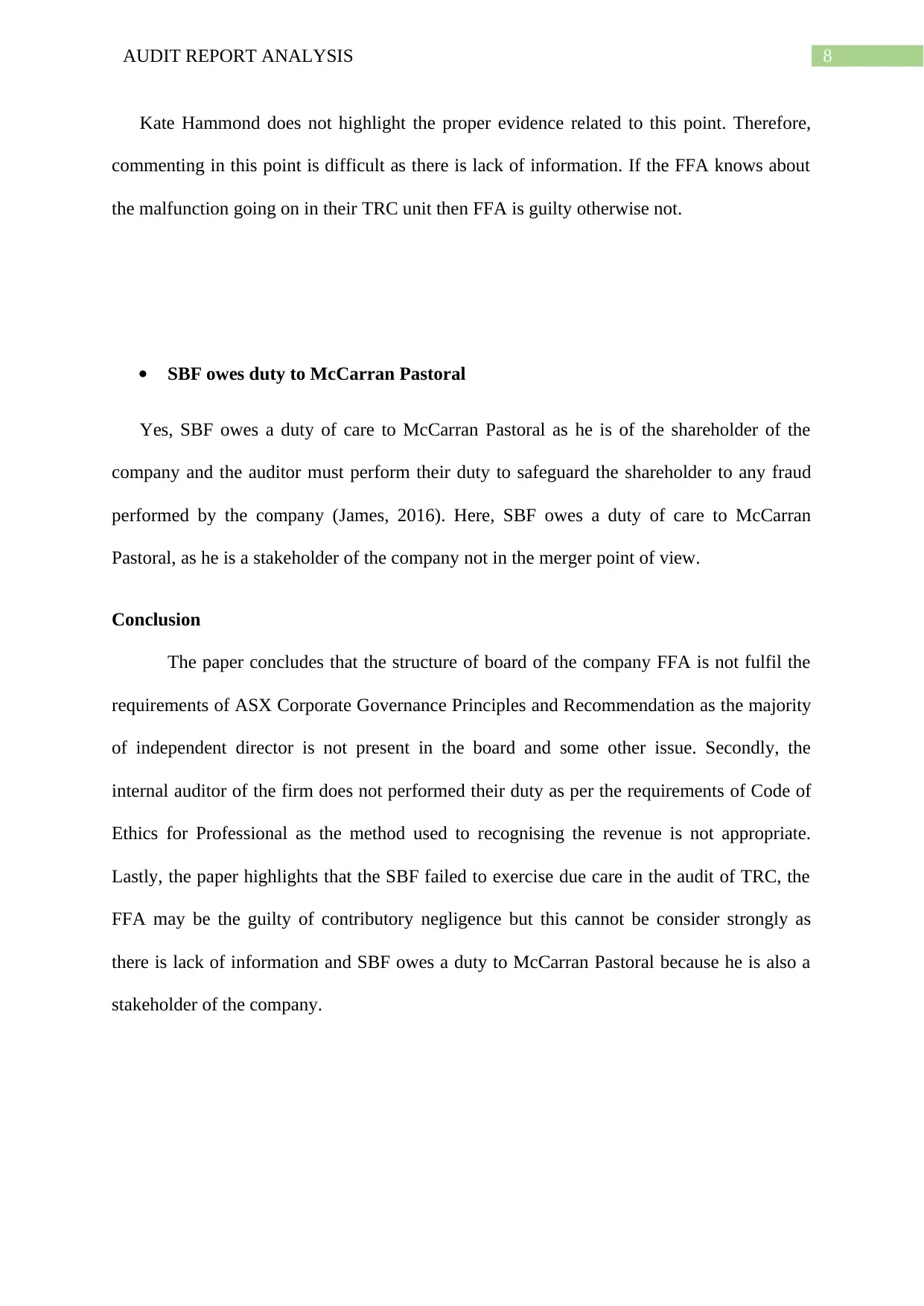
8AUDIT REPORT ANALYSIS
Kate Hammond does not highlight the proper evidence related to this point. Therefore,
commenting in this point is difficult as there is lack of information. If the FFA knows about
the malfunction going on in their TRC unit then FFA is guilty otherwise not.
SBF owes duty to McCarran Pastoral
Yes, SBF owes a duty of care to McCarran Pastoral as he is of the shareholder of the
company and the auditor must perform their duty to safeguard the shareholder to any fraud
performed by the company (James, 2016). Here, SBF owes a duty of care to McCarran
Pastoral, as he is a stakeholder of the company not in the merger point of view.
Conclusion
The paper concludes that the structure of board of the company FFA is not fulfil the
requirements of ASX Corporate Governance Principles and Recommendation as the majority
of independent director is not present in the board and some other issue. Secondly, the
internal auditor of the firm does not performed their duty as per the requirements of Code of
Ethics for Professional as the method used to recognising the revenue is not appropriate.
Lastly, the paper highlights that the SBF failed to exercise due care in the audit of TRC, the
FFA may be the guilty of contributory negligence but this cannot be consider strongly as
there is lack of information and SBF owes a duty to McCarran Pastoral because he is also a
stakeholder of the company.
Kate Hammond does not highlight the proper evidence related to this point. Therefore,
commenting in this point is difficult as there is lack of information. If the FFA knows about
the malfunction going on in their TRC unit then FFA is guilty otherwise not.
SBF owes duty to McCarran Pastoral
Yes, SBF owes a duty of care to McCarran Pastoral as he is of the shareholder of the
company and the auditor must perform their duty to safeguard the shareholder to any fraud
performed by the company (James, 2016). Here, SBF owes a duty of care to McCarran
Pastoral, as he is a stakeholder of the company not in the merger point of view.
Conclusion
The paper concludes that the structure of board of the company FFA is not fulfil the
requirements of ASX Corporate Governance Principles and Recommendation as the majority
of independent director is not present in the board and some other issue. Secondly, the
internal auditor of the firm does not performed their duty as per the requirements of Code of
Ethics for Professional as the method used to recognising the revenue is not appropriate.
Lastly, the paper highlights that the SBF failed to exercise due care in the audit of TRC, the
FFA may be the guilty of contributory negligence but this cannot be consider strongly as
there is lack of information and SBF owes a duty to McCarran Pastoral because he is also a
stakeholder of the company.
⊘ This is a preview!⊘
Do you want full access?
Subscribe today to unlock all pages.

Trusted by 1+ million students worldwide
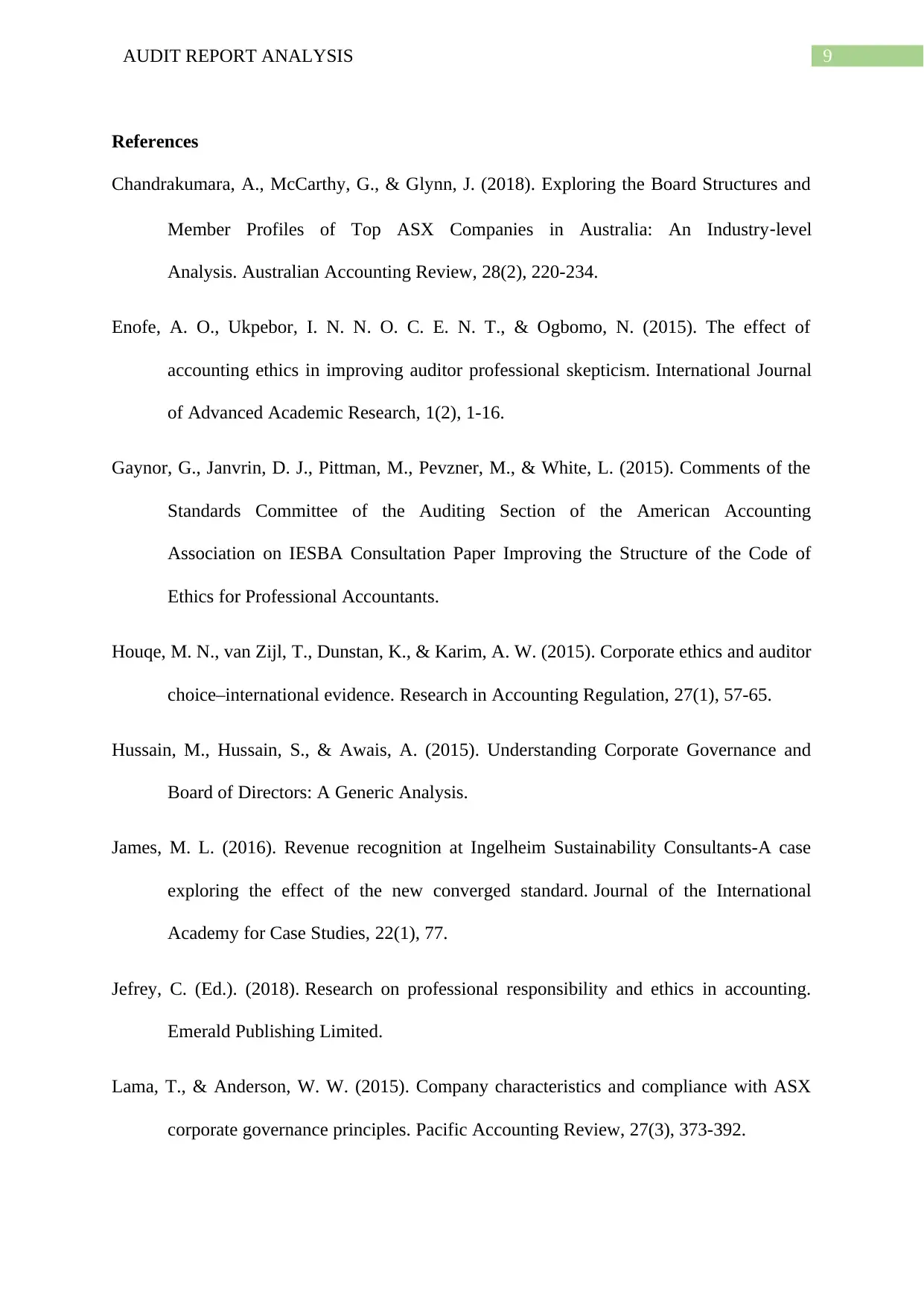
9AUDIT REPORT ANALYSIS
References
Chandrakumara, A., McCarthy, G., & Glynn, J. (2018). Exploring the Board Structures and
Member Profiles of Top ASX Companies in Australia: An Industry‐level
Analysis. Australian Accounting Review, 28(2), 220-234.
Enofe, A. O., Ukpebor, I. N. N. O. C. E. N. T., & Ogbomo, N. (2015). The effect of
accounting ethics in improving auditor professional skepticism. International Journal
of Advanced Academic Research, 1(2), 1-16.
Gaynor, G., Janvrin, D. J., Pittman, M., Pevzner, M., & White, L. (2015). Comments of the
Standards Committee of the Auditing Section of the American Accounting
Association on IESBA Consultation Paper Improving the Structure of the Code of
Ethics for Professional Accountants.
Houqe, M. N., van Zijl, T., Dunstan, K., & Karim, A. W. (2015). Corporate ethics and auditor
choice–international evidence. Research in Accounting Regulation, 27(1), 57-65.
Hussain, M., Hussain, S., & Awais, A. (2015). Understanding Corporate Governance and
Board of Directors: A Generic Analysis.
James, M. L. (2016). Revenue recognition at Ingelheim Sustainability Consultants-A case
exploring the effect of the new converged standard. Journal of the International
Academy for Case Studies, 22(1), 77.
Jefrey, C. (Ed.). (2018). Research on professional responsibility and ethics in accounting.
Emerald Publishing Limited.
Lama, T., & Anderson, W. W. (2015). Company characteristics and compliance with ASX
corporate governance principles. Pacific Accounting Review, 27(3), 373-392.
References
Chandrakumara, A., McCarthy, G., & Glynn, J. (2018). Exploring the Board Structures and
Member Profiles of Top ASX Companies in Australia: An Industry‐level
Analysis. Australian Accounting Review, 28(2), 220-234.
Enofe, A. O., Ukpebor, I. N. N. O. C. E. N. T., & Ogbomo, N. (2015). The effect of
accounting ethics in improving auditor professional skepticism. International Journal
of Advanced Academic Research, 1(2), 1-16.
Gaynor, G., Janvrin, D. J., Pittman, M., Pevzner, M., & White, L. (2015). Comments of the
Standards Committee of the Auditing Section of the American Accounting
Association on IESBA Consultation Paper Improving the Structure of the Code of
Ethics for Professional Accountants.
Houqe, M. N., van Zijl, T., Dunstan, K., & Karim, A. W. (2015). Corporate ethics and auditor
choice–international evidence. Research in Accounting Regulation, 27(1), 57-65.
Hussain, M., Hussain, S., & Awais, A. (2015). Understanding Corporate Governance and
Board of Directors: A Generic Analysis.
James, M. L. (2016). Revenue recognition at Ingelheim Sustainability Consultants-A case
exploring the effect of the new converged standard. Journal of the International
Academy for Case Studies, 22(1), 77.
Jefrey, C. (Ed.). (2018). Research on professional responsibility and ethics in accounting.
Emerald Publishing Limited.
Lama, T., & Anderson, W. W. (2015). Company characteristics and compliance with ASX
corporate governance principles. Pacific Accounting Review, 27(3), 373-392.
Paraphrase This Document
Need a fresh take? Get an instant paraphrase of this document with our AI Paraphraser
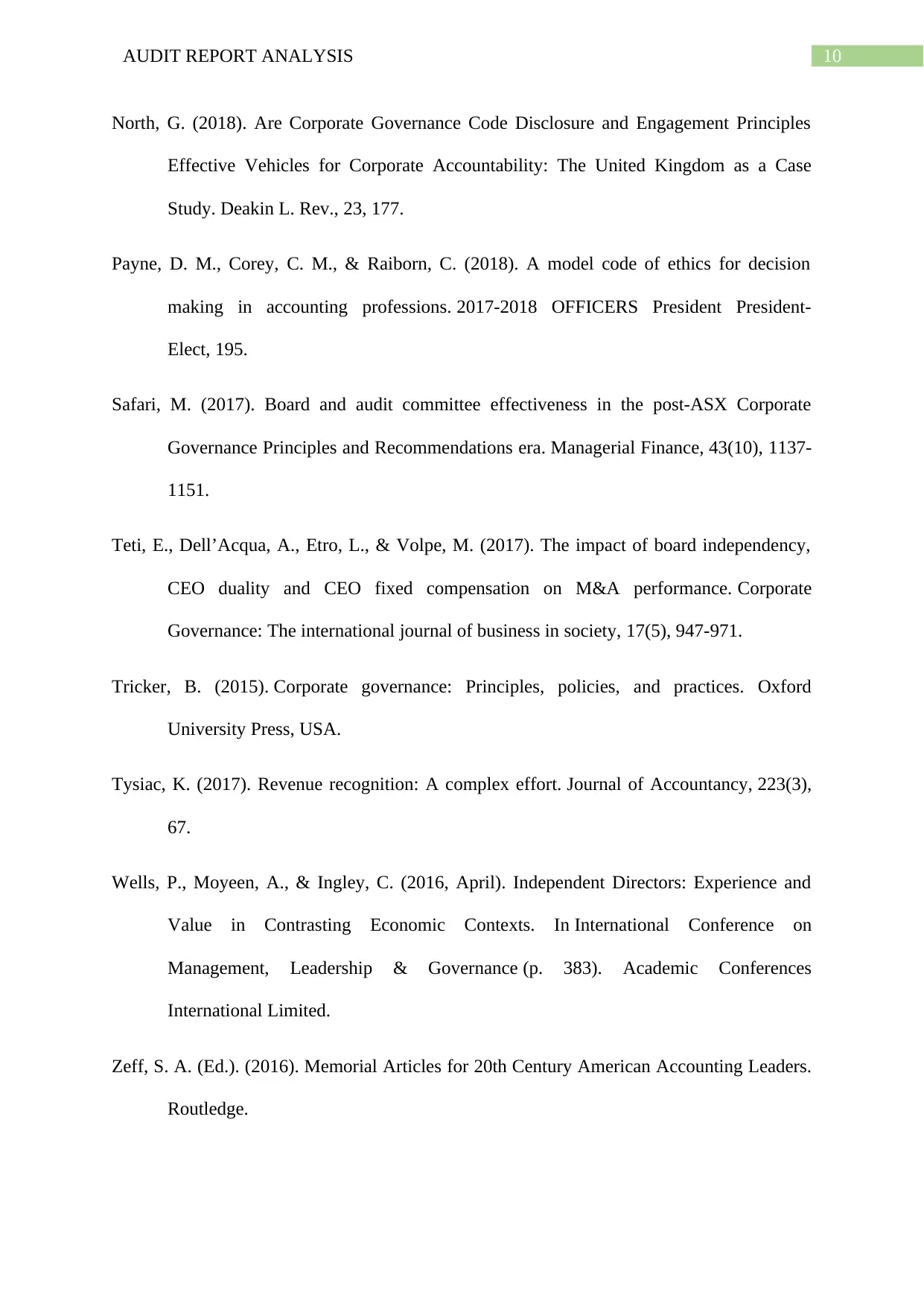
10AUDIT REPORT ANALYSIS
North, G. (2018). Are Corporate Governance Code Disclosure and Engagement Principles
Effective Vehicles for Corporate Accountability: The United Kingdom as a Case
Study. Deakin L. Rev., 23, 177.
Payne, D. M., Corey, C. M., & Raiborn, C. (2018). A model code of ethics for decision
making in accounting professions. 2017-2018 OFFICERS President President-
Elect, 195.
Safari, M. (2017). Board and audit committee effectiveness in the post-ASX Corporate
Governance Principles and Recommendations era. Managerial Finance, 43(10), 1137-
1151.
Teti, E., Dell’Acqua, A., Etro, L., & Volpe, M. (2017). The impact of board independency,
CEO duality and CEO fixed compensation on M&A performance. Corporate
Governance: The international journal of business in society, 17(5), 947-971.
Tricker, B. (2015). Corporate governance: Principles, policies, and practices. Oxford
University Press, USA.
Tysiac, K. (2017). Revenue recognition: A complex effort. Journal of Accountancy, 223(3),
67.
Wells, P., Moyeen, A., & Ingley, C. (2016, April). Independent Directors: Experience and
Value in Contrasting Economic Contexts. In International Conference on
Management, Leadership & Governance (p. 383). Academic Conferences
International Limited.
Zeff, S. A. (Ed.). (2016). Memorial Articles for 20th Century American Accounting Leaders.
Routledge.
North, G. (2018). Are Corporate Governance Code Disclosure and Engagement Principles
Effective Vehicles for Corporate Accountability: The United Kingdom as a Case
Study. Deakin L. Rev., 23, 177.
Payne, D. M., Corey, C. M., & Raiborn, C. (2018). A model code of ethics for decision
making in accounting professions. 2017-2018 OFFICERS President President-
Elect, 195.
Safari, M. (2017). Board and audit committee effectiveness in the post-ASX Corporate
Governance Principles and Recommendations era. Managerial Finance, 43(10), 1137-
1151.
Teti, E., Dell’Acqua, A., Etro, L., & Volpe, M. (2017). The impact of board independency,
CEO duality and CEO fixed compensation on M&A performance. Corporate
Governance: The international journal of business in society, 17(5), 947-971.
Tricker, B. (2015). Corporate governance: Principles, policies, and practices. Oxford
University Press, USA.
Tysiac, K. (2017). Revenue recognition: A complex effort. Journal of Accountancy, 223(3),
67.
Wells, P., Moyeen, A., & Ingley, C. (2016, April). Independent Directors: Experience and
Value in Contrasting Economic Contexts. In International Conference on
Management, Leadership & Governance (p. 383). Academic Conferences
International Limited.
Zeff, S. A. (Ed.). (2016). Memorial Articles for 20th Century American Accounting Leaders.
Routledge.

11AUDIT REPORT ANALYSIS
⊘ This is a preview!⊘
Do you want full access?
Subscribe today to unlock all pages.

Trusted by 1+ million students worldwide
1 out of 12
Related Documents
Your All-in-One AI-Powered Toolkit for Academic Success.
+13062052269
info@desklib.com
Available 24*7 on WhatsApp / Email
![[object Object]](/_next/static/media/star-bottom.7253800d.svg)
Unlock your academic potential
Copyright © 2020–2026 A2Z Services. All Rights Reserved. Developed and managed by ZUCOL.





